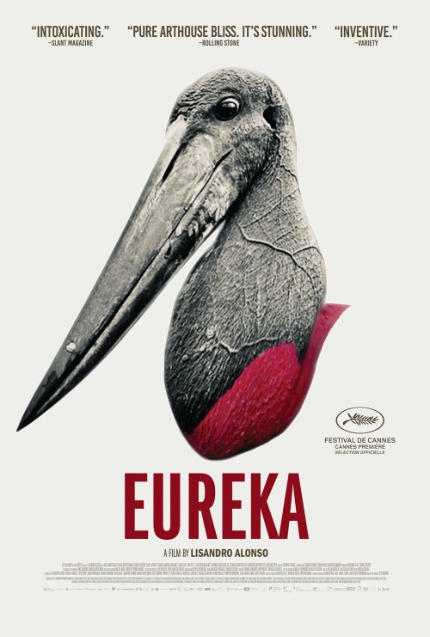EUREKA Review: Swimming With Fascinating Ideas
Viggo Mortensen and Chiara Mastroianni star in Lisandro Alonso's new film.

Argentine filmmaker Lisandro Alonso breaks a nine-year silence with Eureka. In an episodic structure, the film freely contemplates the state of indigenous people of the vast American continents, the past and present, as well as their uneasy relationship with cinema.
It's perhaps his most expansive and ambitious film to date. He digs deep into the distorted representation and history, the effect of colonialism and the influence of Western culture that displaces the natives who are left out of place and out of time. Using his minimalist, elemental way of filmmaking, combined with Deleuzean look at time-image non-linear approach and Native American spirituality, Eureka is a deeply contemplative, perplexing film.
The first segment is a black and white western in full frame, starring Viggo Mortensen and Chiara Mastroianni. With coverages, combining wide and close-up shots, this is very much like a conventional filmmaking, not like Alonso's other works that utilize uninterrupted long takes and wide shots.
Also, it's a rehash of Jauja's themes - looking for a daughter kidnapped by natives in the wild west, which the director intentionally appropriated from John Ford's Western, The Searchers. The gunslinger named Murphy (Mortensen), tracks down where his daughter's kept in a small-town sheriff’s office.
With the help of El Coronel (Mastroianni), he makes his way in with his vengeful guns blazing, to confront the captor of his daughter. But it is the daughter, the same daughter from Jauja (Dutch actress Wilber Malling Agger reviving her role), now all grown up, who turns a gun on him.
It turns out that the first part is a movie within a movie, playing out on TV in a household in the Sioux reservation in South Dakota. Really, it's more like background noise for a Native American cop Alaina (Alaina Clifford) and her young basketball coach niece Sadie (Sadie Lapointe) as they get ready for their work. Alaina is taking her night shifts patrolling the neighborhood. A snowstorm is about to hit the area and she has to stop in, as her dispatcher sends her to the origins of one distress call after another.
In a documentary style, we see the devastation of the Native American population living in the reservation; poverty, violence, incarceration, alcohol and drug use are everyday occurrences and Alaina being a good cop, she attends her job dutifully. Shot in a documentary style, the prolonged segment is as real as it gets. While white folks are playing out The Searchers fantasy for a century, the Natives are struggling with the bleak reality they inherited.
Mastroianni makes another appearance as a French actress researching the reservation life for a film who got stranded in a storm. She is our interlocutor, El Coronel, an unwitting bridge to the natives from as far back as Cortez days. Sadie visits her young cousin in jail, then goes to her grandfather's trailer.
Grandfather tells her, "Time does not exist. It's a human invention." She says she is ready to go away. Her grandfather gives her an herbal tea which will make her sleep and wake up in another life. Say bye to everyone you know. He says. Lapointe, just like many of Alonso's non-actors, shines, as a young woman, who wholly embodies the terrible fate befallen to Native Americans in the 21st century.
Uncharacteristically for Alonso, we are presented with beautiful transition dissolves into the next segment, which takes place in Brazilian Amazon jungle, where a small tribe of peaceful natives sit around and talk about their dreams. Their clothes and an old-style soda can tell us that this takes place in the past, during the Amazon's gold-rush days of the 1970s.
A fight breaks out in their tranquil existence as jealousy between two men over a woman which results in stabbing and the stabber fleeing the village. The man then joins the gold-rush prospecting party nearby. El Coronel makes a third appearance, this time as a white man in charge of the prospecting operation. He is a typical middleman who would do anything for money. El Coronel tells the man that he doesn't belong there and would help him to get out of there.
With such a strong and engaging middle part with Alaina and Sadie, the third part of the film doesn't quite gel with the rest of the film. But overall, Eureka is always a fascinating watch, full of ideas swimming around your head long after you leave the theater.
Review originally published during the New York Film Festival in October 2023. The film opens Friday, September 20, only in movie theaters, via Film Movement. Visit their official site for more information.
Dustin Chang is a freelance writer. His musings and opinions on everything cinema and beyond can be found at www.dustinchang.com







